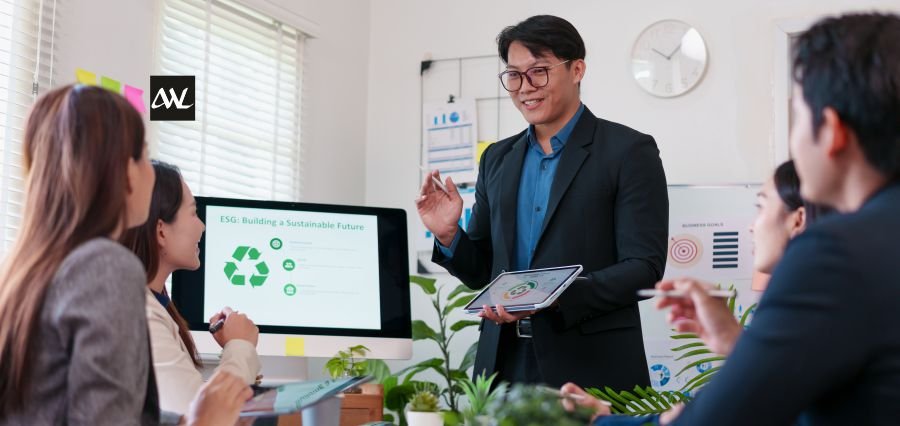The Middle Eastern region, the Arabian Peninsula in particular, is transforming like never before through economic diversification, technological advancement, and sustainability. As nations within the region struggle to transition away from the oil model, sustainable leadership is a top priority enabler in shaping the future of government, business, and society. Sustainable leadership is more than ordinary practice in management with its emphasis on long-term value creation, responsible stewardship, and environmental stewardship. Sustainable leaders who aim to achieve this vision are concerned with the interdependence of economic growth, social progress, and environmental protection in framing a road map to prosperity and resilience. For Arabia, sustainable leadership is both a strategic necessity and an ethical necessity. The region is struggling with the typical challenges, i.e., water scarcity, increased carbon emissions, and economic diversification to achieve future stability. The executives need to embed sustainability into business administration, management, policymaking, and urban planning in order to achieve green and inclusive growth. With the practice of a culture of responsibility and innovation, sustainable leaders are able to guide organizations, communities, and governments toward aligning their goals with greater environmental and social purposes.
Embedding Sustainability in Corporate Governance
Corporate governance lies at the heart of handing over sustainable practices in all dimensions. Arabian firms are learning today that profitable business that unites social, environmental, and ethical responsibility is what determines long-term success in business. Private business CEOs now put transparency, ethical choices, inclusivity, and stakeholder engagement as the minimum values first. Companies are developing robust systems of sustainability that navigate through climate risk, resource efficiency, and social justice in a manner that their companies become a catalyst for local people and global sustainability agendas.
Investments in renewable energy, circular economy operations, and sustainable value chains also become part of the business toolkit. The emerging technology, innovative solutions, and science-based solutions are being used by the leaders in order to reduce the carbon footprints, maximize the resources use, and maximize the performance. Companies that take the concept of sustainability into decision-making processes not only comply with the regulations but also optimize the value of the brand, competitive advantage, and investor confidence. With a region poised to witness economic growth of intense magnitude, there is no logical reason why sustainable company governance cannot simultaneously be an ethical necessity and a competitive tool that can ensure long-term sustainability.
Innovating Policy in Public Sector Leadership
Public sector leadership also plays a key role to lead sustainable development in Arabia. Governments are now formulating new and creative policies favoring renewable energy, green infrastructure, and sustainable urbanization. Solar and wind energy programs, water harvesting initiatives, smart city programs, and others represent the desire to reduce the impact on the environment as much as possible, maximize happiness and well-being of people, and spur economic development. By forming a public-private partnership, policymakers can tap into the experience of firms operating in the private sector, transformative ideas, and sources of investment capital and bring sustainable ideas to scale at a cost-effective level.
Through this, education, research, and workforce building become core roles of public sector leadership. Public governments are investing in capability-building programs that give the next generation of leaders’ skills in innovation, technology, sustainability, and ethical leadership. Keeping in view education, capacity development, and knowledge-transfer programs, Arabian countries have the capability to build leaders who are able to work in high-performing economic systems but are still devoted to sustainable, ethical, and responsible policy. Developing public leadership and policy innovation ensure that sustainable development is ingrained in Arabia’s tomorrow.
Fostering Ethical and Transformational Leadership
Sustainable leadership demands an ethics, inclusiveness, innovation, and accountability culture. The leaders in organizations and societies should develop trust, transparency, collaboration, and shared vision. Ethical decision-making involves deep consideration of the societal, environmental, and long-term economic consequences of business and policy decisions. Transformational leadership is from empowerment, sponsorship, and long-term strategic planning to ensure that organizations can redesign themselves as challenges emerge while sustainability, resilience, and innovation are guiding philosophies.
It involves ongoing communication of sustainability objectives, professional development training, rewards and appraisals, and innovation and collaboration as ways of facilitating such a culture. Diversity, equity, stakeholders’ engagement, and business social responsibility are the aspects that leaders prioritize to develop strong organizations that can handle social, economic, and environmental risks. By embracing transformational and ethical leadership culture, Arabia can foster high-quality, sustainable, inclusive, and competitive future development. Through such individuals embracing such programs, they will not just enhance economic prosperity but also leave a long-lasting positive footprint for society, communities, and the environment.
Conclusion
Systems-oriented Arabian system of sustainable leadership, combining corporate governance, policy-making, and business ethics culture, in a strategic manner. Guided directly by the vision to build long-term value, preserve the environment, social responsibility, and community engagement, the leaders will overcome the difficult situation of the region and build resilience, innovativeness, and prosperity. The Arabian world is at the threshold where visionary, responsible, and sustainable leadership will shape its destiny in the global competitive economy. With sustainability, ethical practice, and long-term planning in all leadership domains, Arabia can have an economically strong, socially just, ecologically secure, and internationally recognized future.
Read Also : 10 Best Online Side Hustles to Boost Your Income in 2025




